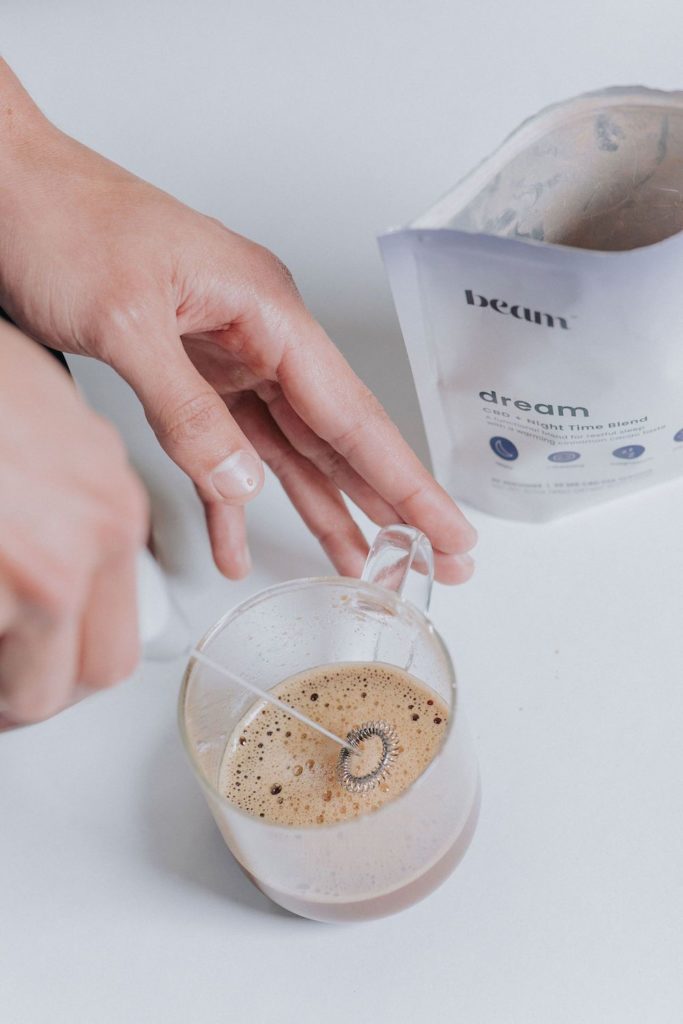The first few months of 2020 rivaled my early postpartum days in terms of sleep quantity and quality. The combined stressors of running a business during COVID, coordinating a gym buildout and move, and homeschooling 3 kids made for many a sleepless night. That is, until I tried CBD for sleep
One night, I did the WORST possible thing you can do when you can’t sleep—one of the things I always tell my clients not to do and rarely do myself. I was scrolling through Instagram when I saw a post by one of my favorite CrossFit athletes about her favorite sleep aid—a CBD blend called Dream. Apparently abnormal behavior was a theme that night, because I ordered the Dream on the spot (and anyone who knows me knows that I rarely use supplements and am super picky about those I do).
When my Dream arrived a few days later, I mixed the powder into a mug of warm water and downed it before bed. I don’t know what kind of sorcery went into making that powder (actually, yes I do, but we’ll get to that in a second). Within 20 minutes I was OUT. I could’ve slept through a tornado for 8 blissful hours. Even better, I woke up refreshed and not the slightest bit groggy.
And this was not a fluke. I’ve used Dream for a couple of months now with similar results most (not all, but most) nights I use it.
So, should you be taking CBD for sleep? Let’s discuss.
What is CBD?
CBD is short for cannabidiol, which is one of many non-psychoactive compounds found in cannabis. In layman’s terms, it’s a chemical that’s found in cannabis plants that won’t get you baked and won’t get you arrested (at least, not if you know what to look for).
Let’s get a little more specific. CBD can be derived from either hemp plants or cannabis plants. Products that come from hemp plants and that contain less than 0.3% THC are legal at the federal level thanks to the passage of the 2018 Farm Bill (although state regulations vary). Because of the low concentration of THC (which is the psychoactive compound in pot), you’re also very unlikely to feel stoned when using CBD products.
CBD products derived from cannabis plants naturally contain more THC. These products are illegal in most states that don’t have recreational marijuana.
(I go into this in a bit more detail here).
Important note: While legal in Missouri, even THC-free CBD is off-limits to people in certain professions. Check with your employer before taking it if you’re not sure.
Why Sleep is Important
Lack of sleep makes you feel like shit, as anyone who’s ever suffered from insomnia knows. What you may not realize is that sleep is super important for both athletic performance and body composition.
From a performance standpoint, adequate sleep promotes muscle growth and repair. Case in point: Approximately 95% of the human growth hormone made in our bodies is made while we sleep. Studies also suggest that coordination, reaction time, and motivation improve with more sleep (1).
Insomnia can also make it more difficult to maintain or lose weight. Just one night of sleep deprivation can increase levels of a hormone called ghrelin, which stimulates the appetite.
What’s more, ongoing sleep deprivation has been linked with increased levels of the stress hormone cortisol and decreased levels of the satiety hormone leptin.
These changes make you more likely to feel satisfied after eating, but also lower impulse control in general. If you’ve ever felt like you can’t resist the urge for carbs, sweets, and other highly palatable foods after a poor night’s sleep, this may very well be the cause (2)!
Why CBD for Sleep?
Admittedly, studies on CBD are sparse relative to many other types of supplements. This is because cannabidiol was illegal pretty much across the board until 2018.
Early returns on CBD and sleep are promising (3).
In one observational study including 72 patients at a psychiatric clinic with history of anxiety or insomnia, 67% of subjects reported better sleep within the first month of taking CBD.
Subjective sleep scores fluctuated a bit, which may speak to the fact that CBD could be just one piece of a larger puzzle when it comes to improving sleep (4).
This larger puzzle includes:
- a regular sleep-wake schedule
- avoiding devices in the hours before bedtime
- spending time in the sun
- taking preventative measures against stress
- limiting caffeine and alcohol
Some people also find supplements like magnesium (which helps the body and brain relax and promotes restful sleep) and melatonin (which promotes relaxation) helpful. Which brings me back to Dream…
About Dream
Made by a company called Beam, Dream is a blend of THC-free CBD, PLUS melatonin, magnesium, L-theanine, and reishi. When mixed with warm water, milk, or nondairy milk, it tastes like hot chocolate with just a hint of cinnamon.
Most importantly (and this is crucial for all supplements), Beam products are tested by a third party to ensure that they’re free from THC and contain proper concentrations of CBD.
Dream (along with other Beam products) is now available for purchase at Two Six. The sleep formula is available in single serving packets, as well as 30-serving bags. Grab yours in the supplement area today!
P.S. If you’re new to using CBD, magnesium, or melatonin, you may want to start with ½ serving to assess your tolerance (although CBD is generally well-tolerated with few side effects).
Note: This is not a sponsored post. Aside from selling Beam at 26, we do not receive any compensation for the opinions expressed.

